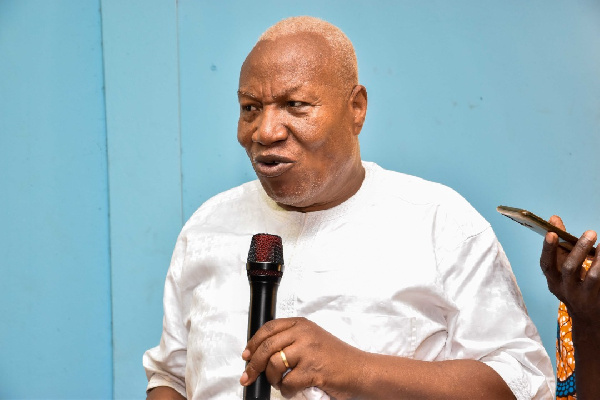adverts
Professor Joshua Alabi, the campaign manager for John Mahama’s 2024 campaign, has offered an in-depth analysis of the factors contributing to the New Patriotic Party’s (NPP) poor performance in the Northern regions during the 2024 general elections.
Speaking on The Point of View with Bernard Avle on Channel One TV, Professor Alabi pointed to unfulfilled promises, leadership shortcomings, and growing voter disillusionment as key reasons for the NPP’s decline in support.
The NPP entered the 2024 elections with high expectations in the Northern regions, banking on the influence of their presidential candidate, Dr. Mahamudu Bawumia, a native of the area and leader of the government’s Economic Management Team. However, according to Professor Alabi, the NPP’s inability to deliver on major campaign promises led to their downfall.
adverts
Among the most prominent unfulfilled promises was the “One Village, One Dam” initiative, a flagship program aimed at constructing small-scale dams across Northern communities to support agriculture and irrigation. Professor Alabi explained that the initiative was an attractive campaign message in 2016 and 2020, as water shortages significantly impact livelihoods in the region. However, the NPP’s failure to deliver on this promise left many voters feeling betrayed.
Additionally, the “One Constituency, One Million Dollars” pledge, which promised annual funding to support local development projects, remained largely unrealized. This further fueled dissatisfaction among the electorate, who had anticipated significant economic and infrastructural improvements.
Professor Alabi criticized Dr. Bawumia’s leadership as the head of the Economic Management Team, pointing out that his inability to fulfill these promises cast doubt on his credibility.
“Another Northerner comes and tells them… One District, One Dam… So when you come and tell us that, it is a very good campaign message,” Alabi stated. “But sitting in the chair as the leader of the Economic Management Team, he couldn’t even fulfill the promises he made.”
Alabi highlighted that the Northern electorate felt let down by Bawumia, who they believed had a unique responsibility to address their needs as a native of the region. Instead, his perceived inaction became a rallying point for voters to return to the National Democratic Congress (NDC).
The NDC capitalized on the NPP’s failings by presenting itself as the more reliable alternative. Professor Alabi noted that the Northern electorate’s shift back to the NDC was driven by their trust in John Mahama, who had previously demonstrated a commitment to addressing the region’s challenges.
“They had to shift to their own man, who had been truthful to them and had been doing what he told them he would do,” Alabi remarked.
Under Mahama’s leadership, the NDC emphasized its track record of implementing tangible projects in the North, contrasting this with the NPP’s unfulfilled promises. The result was a decisive victory for the NDC in the Northern regions, where they won the majority of parliamentary seats and significantly increased their share of the presidential vote.
Professor Alabi stressed that the NPP’s poor performance in the North reflects a broader demand for accountability in Ghana’s political landscape. He explained that voters are no longer swayed by promises alone but are now scrutinizing politicians’ ability to deliver on their commitments.
“The people want accountability and results. When promises are made and not kept, the electorate will move their support to those they believe will deliver,” Alabi said.
The NDC’s success in the Northern regions serves as a reminder of the importance of building trust with the electorate. For the NPP, the 2024 elections were a stark lesson in the consequences of overpromising and underdelivering, particularly in areas where development is urgently needed.
As Ghana’s political landscape evolves, parties will need to prioritize tangible outcomes and genuine engagement with voters to maintain their support. For now, the NDC’s ability to address the needs of the Northern electorate has positioned them as the dominant political force in the region.
The 2024 elections underscore the significance of fulfilling campaign promises and maintaining credibility with the electorate. As Professor Alabi articulated, the NPP’s inability to meet the expectations of Northern voters was a critical factor in their defeat.
Meanwhile, the NDC’s strategic focus on trust and tangible results has solidified their position as a party committed to the needs of the people.
The outcome of the elections is a clear message to Ghanaian political parties: in a democracy, the trust of the people must be earned through action, not just words.


